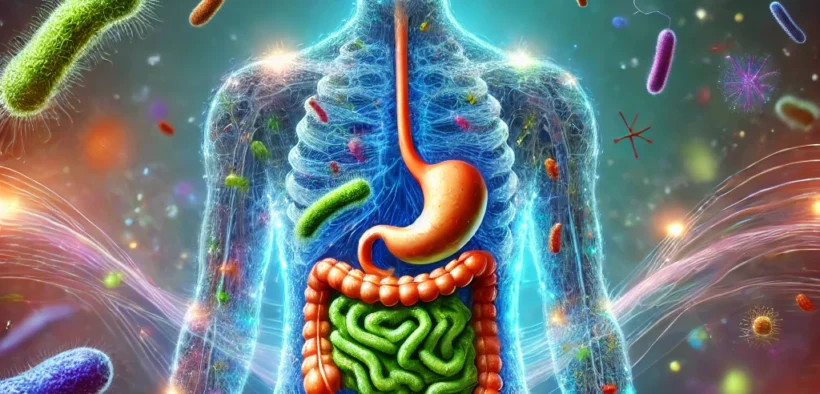What Is a Microbiome? Importance, Gut Health, and How to Improve It
Share

What Is a Microbiome? Importance, Gut Health, and How to Improve It
Most of us consider ourselves individuals, not ecosystems, but we are much more than just “us.” Thanks to the Human Microbiome Project (HMP) — a groundbreaking initiative cataloging the various microbes in our bodies — scientists have discovered that each person is a vast ecosystem housing trillions of microorganisms. This is what we refer to as the microbiome.
What Is the Microbiome, and Why Is It Important for Your Health?
The microbiome refers to the microorganisms (bacteria, viruses, fungi, etc.) that live in our body, primarily in the gut, but also in the mouth, nose, skin, and other areas. The microbiome plays a vital role in digestion, immune defense, and even mental health.
The microbiome is essential because these microbes help process food, protect against harmful pathogens, and regulate inflammation. Without a balanced microbiome, your body would face challenges in maintaining health, leading to issues like digestive disorders, weakened immunity, and more.
How Does the Microbiome Affect Digestion and Overall Health?
One of the microbiome’s primary roles is to aid in the digestion of complex carbohydrates and fiber, producing nutrients that are beneficial for our gut lining and immune system. When the microbiome is healthy, it supports smooth digestion and nutrient absorption, contributing to overall well-being.
However, when the balance of gut microbes is disrupted, a condition known as dysbiosis, it can lead to digestive problems like bloating, constipation, and more severe conditions like irritable bowel syndrome (IBS). Additionally, an unhealthy microbiome has been linked to obesity, diabetes, and inflammatory diseases.
Can You Improve the Microbiome Through Diet? What Foods Are Good for Gut Health?
Yes, the microbiome can be improved through diet. Eating a variety of fiber-rich, plant-based foods and fermented foods helps promote beneficial gut bacteria. Here are some top microbiome-friendly foods:
- Probiotic-rich foods (yogurt, kefir, sauerkraut)
- Prebiotic fibers (garlic, leeks, onions, bananas)
- Fruits and vegetables (high in fiber)
- Whole grains
- Legumes and beans
What Happens When the Microbiome Is Imbalanced? How Does It Impact Mental Health?
When the microbiome is imbalanced (dysbiosis), harmful bacteria can overgrow, leading to digestive problems, infections, and inflammation. This imbalance can affect not only the gut but also your entire body, contributing to conditions such as leaky gut syndrome, chronic fatigue, and immune disorders.
There is a direct connection between gut health and mental health, known as the gut-brain axis. An imbalanced gut can influence mood, anxiety, and even depression. This is why a healthy gut microbiome is crucial not only for physical health but also for mental well-being.
Can Antibiotics Harm the Microbiome, and How Can You Restore It?
Antibiotics can have a negative impact on the microbiome by killing off both harmful and beneficial bacteria. While antibiotics are necessary to treat infections, overuse can lead to an imbalance that harms digestion and immunity.
To restore the microbiome after taking antibiotics, focus on consuming probiotic-rich foods, prebiotics, and a diverse range of plant-based foods. Probiotic supplements may also help repopulate beneficial bacteria.
How Does Stress Affect the Microbiome? What Are Signs of a Healthy Microbiome?
Chronic stress can weaken the immune system and negatively impact gut bacteria, leading to reduced microbial diversity. Stress may even contribute to conditions like IBS by disrupting gut function.
A healthy microbiome is characterized by regular bowel movements, minimal digestive discomfort, a strong immune system, and clear skin. If you experience frequent bloating, gas, or digestive issues, your microbiome may be imbalanced.
How Does the Microbiome Differ From Person to Person? Are There Microbiome Tests?
Each person’s microbiome is unique, shaped by factors such as diet, environment, and genetics. Even identical twins have different microbiomes. This uniqueness is important for maintaining health, as different microbes provide different benefits.
There are tests available that can analyze your gut microbiome, typically through stool samples. These tests can provide insight into your microbial diversity and identify any imbalances that may be affecting your health.
Can Poor Microbiome Health Lead to Diseases? How Can Probiotics Help?
An unhealthy microbiome has been linked to a wide range of diseases, including obesity, diabetes, autoimmune disorders, and digestive problems. Poor gut health can also weaken the immune system, leaving the body vulnerable to infections.
Probiotics, found in fermented foods and supplements, help restore balance by increasing beneficial bacteria in the gut. Studies show that probiotics improve digestion, strengthen the immune system, and support mental health by enhancing the gut-brain connection.
“There are more microbes in your digestive tract than there are cells in your entire body.”
Top 20 Factors That Disrupt Your Microbiome
| Disruptive Factors | Effect on Microbiome |
|---|---|
| 1. Alcohol consumption | Can kill off beneficial gut bacteria. |
| 2. Antacid use | Alters stomach acidity, affecting microbiome balance. |
| 3. Antibiotic use | Destroys both good and bad bacteria in the gut. |
| 4. Birth control pills | May impact gut flora by affecting hormones. |
| 5. Blood sugar imbalances | Can feed harmful bacteria and yeast. |
| 6. Chlorinated water | Chlorine can kill beneficial microbes. |
| 7. Consumption of antibiotic- and hormone-containing foods | Can disrupt gut flora balance. |
| 8. Diabetes | Linked to microbiome disruption and harmful bacteria overgrowth. |
| 9. Excessive sugar intake | Feeds harmful bacteria and promotes imbalance. |
| 10. Hypothyroid function | Affects digestion and gut health. |
| 11. Immune-suppressing drugs | Weakens the immune response and alters gut flora. |
| 12. Inadequate hydrochloric acid production | Leads to poor digestion and microbial imbalance. |
| 13. Mercury amalgam dental fillings | Mercury toxicity may alter gut bacteria. |
| 14. Multiple sexual partners | Increases risk of harmful microbial transmission. |
| 15. Nutritional deficiencies | Weakens the gut’s defense against harmful bacteria. |
| 16. Poor diet | Can lead to microbiome disruption and harmful bacteria growth. |
| 17. Recreational drug use | Impacts the body’s microbiome negatively. |
| 18. Chronic stress | Weakens the immune system and alters gut health. |
| 19. Toxic exposures | Can alter microbial balance and increase inflammation. |
| 20. Weakened immunity | Allows harmful bacteria to overgrow and disrupt balance. |
How to Maintain a Healthy Microbiome
Our microbiome is a delicate ecosystem that plays a vital role in maintaining health. To keep your gut microbiome balanced and healthy, here are some key tips:
- Consume a balanced diet rich in fiber and fermented foods.
- Avoid excessive antibiotic use unless absolutely necessary.
- Stay hydrated with clean, filtered water.
- Manage stress through activities like yoga or meditation.
- Get regular exercise, which supports microbial diversity.
A healthy microbiome is key to a healthy life. By taking care of your gut, you support your overall well-being and longevity.
- Braised Halibut with Carrots and Coriander: A Weeknight Delight
- Understanding Supraspinatus Tendinopathy with Partial Thickness Tear: Symptoms, Treatment, and Recovery
- Stevia: Why You Should Always Read Labels on Keto-Friendly Products Carefully
- Erythritol: A Comprehensive Guide to the Pros and Cons of This Popular Sweetener
- Tasty- Yummy Tex-Mex Chicken and Rice






